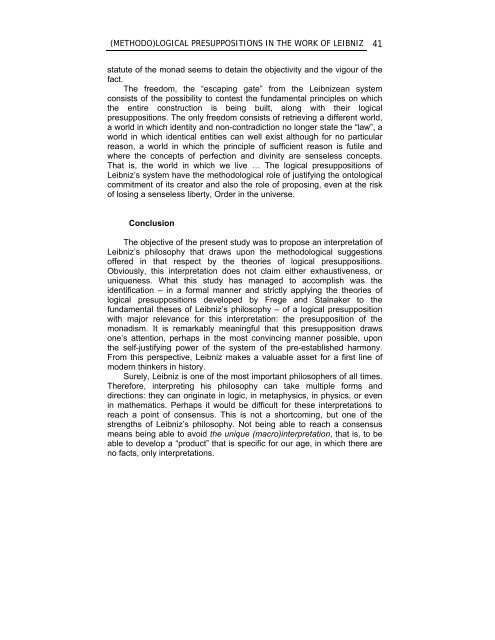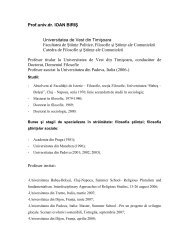analele universităţii de vest din timişoara annales universitatis ...
analele universităţii de vest din timişoara annales universitatis ...
analele universităţii de vest din timişoara annales universitatis ...
Create successful ePaper yourself
Turn your PDF publications into a flip-book with our unique Google optimized e-Paper software.
(METHODO)LOGICAL PRESUPPOSITIONS IN THE WORK OF LEIBNIZ 41<br />
statute of the monad seems to <strong>de</strong>tain the objectivity and the vigour of the<br />
fact.<br />
The freedom, the “escaping gate” from the Leibnizean system<br />
consists of the possibility to contest the fundamental principles on which<br />
the entire construction is being built, along with their logical<br />
presuppositions. The only freedom consists of retrieving a different world,<br />
a world in which i<strong>de</strong>ntity and non-contradiction no longer state the “law”, a<br />
world in which i<strong>de</strong>ntical entities can well exist although for no particular<br />
reason, a world in which the principle of sufficient reason is futile and<br />
where the concepts of perfection and divinity are senseless concepts.<br />
That is, the world in which we live … The logical presuppositions of<br />
Leibniz’s system have the methodological role of justifying the ontological<br />
commitment of its creator and also the role of proposing, even at the risk<br />
of losing a senseless liberty, Or<strong>de</strong>r in the universe.<br />
Conclusion<br />
The objective of the present study was to propose an interpretation of<br />
Leibniz’s philosophy that draws upon the methodological suggestions<br />
offered in that respect by the theories of logical presuppositions.<br />
Obviously, this interpretation does not claim either exhaustiveness, or<br />
uniqueness. What this study has managed to accomplish was the<br />
i<strong>de</strong>ntification – in a formal manner and strictly applying the theories of<br />
logical presuppositions <strong>de</strong>veloped by Frege and Stalnaker to the<br />
fundamental theses of Leibniz’s philosophy – of a logical presupposition<br />
with major relevance for this interpretation: the presupposition of the<br />
monadism. It is remarkably meaningful that this presupposition draws<br />
one’s attention, perhaps in the most convincing manner possible, upon<br />
the self-justifying power of the system of the pre-established harmony.<br />
From this perspective, Leibniz makes a valuable asset for a first line of<br />
mo<strong>de</strong>rn thinkers in history.<br />
Surely, Leibniz is one of the most important philosophers of all times.<br />
Therefore, interpreting his philosophy can take multiple forms and<br />
directions: they can originate in logic, in metaphysics, in physics, or even<br />
in mathematics. Perhaps it would be difficult for these interpretations to<br />
reach a point of consensus. This is not a shortcoming, but one of the<br />
strengths of Leibniz’s philosophy. Not being able to reach a consensus<br />
means being able to avoid the unique (macro)interpretation, that is, to be<br />
able to <strong>de</strong>velop a “product” that is specific for our age, in which there are<br />
no facts, only interpretations.




